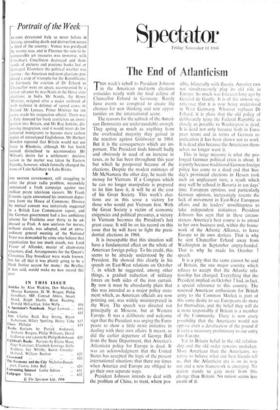The End of Atlanticism
TrTHIS week's rebuff to President Johnson 1 in the American mid-term elections coincides neatly with the final eclipse of Chancellor Erhard in Germany. Rarely have events so conspired to create the chances for new thinking and new oppor- tunities on the international scene.
The reasons for the setback of the Ameri- can Democrats are understandable enough.
They spring as much as anything from the overloaded majority they gained in the reaction against Goldwater in 1964. But it is the consequences which are im- portant. The President finds himself badly and obviously in need of an increase in taxes, as he has been throughout this year but which he postponed because of the elections. Despite the modest estimates of Mr McNamara the other day, he needs the money for Vietnam. If a Congress which he can no longer manipulate is prepared to let him have it, it will be at the cost of his Great Society. This week's elec- tions are in this sense a victory for those who would put Vietnam first. With the Great Society a victim of economic exigencies and political pressures, a victory in Vietnam becomes the President's last great cause. It will be on his record on this issue that he will have to fight the presi- dential elections in 1968.
It is inescapable that this situation will have a fundamental effect on the whole of American foreign policy. To his credit, this seems to be already understood by the President. He showed this clearly in his speech on East-West relations on October 7. in which he suggested, among other things, a gradual reduction of military forces on both sides of the iron curtain. By now it must be abundantly plain that this was intended as a major policy state- ment which, as American officials are now pointing out, was widely misinterpreted in the West. The speech was directed not principally at Moscow, but at Western Europe. It was a deliberate and welcome sign that the President was urging the Euro- peans to show a little more initiative in dealing with their own affairs. It meant, as did the earlier departure of George Ball from the State Department, that America's Atlanticist policy for Europe is dead. It was an acknowledgment that the United States has accepted the logic of the present international situation; that there are times when America and Europe are obliged to go their own separate ways.
President Johnson intends to deal with the problem of China, to treat, where pos- sible. bilaterally with Russia. America can- not simultaneously play its old role in Europe. So much was foreseen long ago by General de Gaulle. lt is of the utmost sig- nificance that it is now being understood in West Germany. Whoever replaces Dr Erhard, it is plain that the old policy of deliberately tying the Federal Republic as closely as possible to Washington is dead. It is dead not only because both in Euro- pean terms and in terms of German re- unification it has been shown not to work. It is dead also because the Americans them- selves no longer want it.
This in large measure is what the pro- longed German political crisis is about. It is partly because traditional German foreign policy has come to a dead end that Sun- day's provincial elections in Hessen took such an unpleasant turn, a result which may well be echoed in Bavaria in ten days' time. European opinion, and particularly German opinion, increasingly resents the lack of movement in East-West European affairs and its leaders' unwillingness to take independent initiatives. President Johnson has seen that in these circum- stances America's best course is to attend to her own business and, within the frame- work of the Atlantic Alliance, to leave Europe to its own devices. That is why he sent Chancellor Erhard away from Washington in September empty-handed. That is why he made his October 7 speech.
It is a pity that the same cannot be said of Britain, the one major country which refuses to accept that the Atlantic rela- tionship has changed. Everything that the President implied on October 7 had, in fact, a special relevance to this country. The renewed American enthusiasm for British entry to the Common Market is part of this same desire to see Europeans do more for themselves, and the belief they will do it more responsibly if Britain is a member of the Community. There is now every possibility that the Americans would not oppose even a devaluation of the pound if it were a necessary preliminary to our entry into Europe.
Yet in Britain belief in the old relation- ship and the old order remains unshaken. More American than the Americans, we refuse to believe what our best friends tell us. that the Atlanticist era is on its way out and a new framework is emerging. No nation stands to gain more from this change than Britain. No nation seems less aware of it.






































 Previous page
Previous page